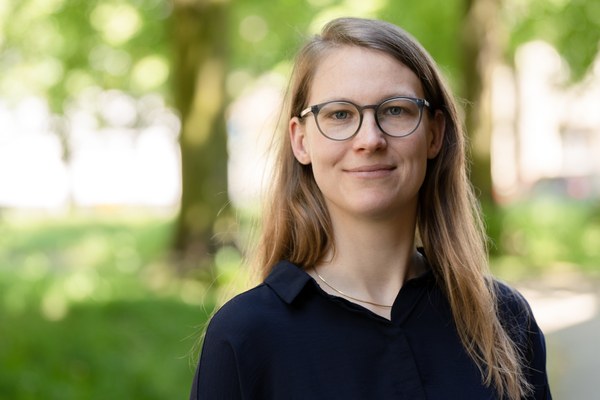Prof. Dr. Ulrike Gisch
Leitung der Professur
|
© JLU / Rolf K. Wegst |
|
Forschungsschwerpunkte
- Psychologische Determinanten des Ernährungsverhaltens und Gewichtsstatus (u.a. intuitives Essverhalten)
- Neue Ansätze zur Behandlung von Ess- und Gewichtsstörungen
- Familie und Essen: Trans- und intragenerationale Effekte
- Nachhaltiges Ernährungsverhalten
- Psychodynamische Aspekte des (pathologischen) Essens und Gewichts
Für weiterführende Informationen zu den Forschungsschwerpunkten schauen Sie gern unter Forschung.
Projekte
Daten zur Vita
2024
- Robert, M., Allès, B., Gisch, U. A., Shankland, R., Hercberg, S., Touvier, M., Leys, C., & Péneau, S. (2024). Cross-sectional and longitudinal associations between self-esteem and BMI depends on baseline BMI category in a population-based study. BMC Public Health, 24, 230. https://doi.org/10.1186/s12889-024-17755-z
2023
- Wortmann, H. R., Gisch, U. A., Jannasch, F., Knüppel, S., Bergmann, M. M., & Warschburger, P. (2023). Dyadic analysis of the relationship between food neophilia and dietary quality among older heterosexual couples: Findings from the NutriAct Family Study. Food Quality and Preference, 110, 104952. https://doi.org/10.1016/j.foodqual.2023.104952
- Warschburger, P., Wortmann, H. R., Walter, L. P., Bergmann, M. M., & Gisch, U. A. (2023). Stability and longitudinal association between Body Mass Index and maladaptive eating behaviors in older adults: Results from the NutriAct Family Study (NFS). Eating Behaviors, 50, 101778. https://doi.org/10.1016/j.eatbeh.2023.101778
- Wortmann, H. R., Gisch, U. A., Bergman, M. M., & Warschburger, P. (2023). Exploring the Longitudinal Stability of Food Neophilia and Dietary Quality and Their Prospective Relationship in Older Adults: A Cross‐Lagged Panel Analysis. Nutrients, 15, 1248. https://doi.org/10.3390/nu15051248
2022
- Warschburger, P., Wortmann H. R., Gisch U. A., Baer, N.-R., Schenk, L., Anton, V., & Bergmann, M. M. (2022). An experimental approach to training interoceptive sensitivity: Study protocol for a pilot randomized controlled trial. Nutrition Journal, 21:74. https://doi.org/10.1186/s12937-022-00827-4
- Gisch U. A., Ahlers, E., Lee, D., Heuser-Collier, I., & Somasundaram, R. (2022). A new volunteer program to enhance the quality of emergency department care for older patients with cognitive dysfunction. Geriatric Nursing, 48, 94-102. https://doi.org/10.1016/j.gerinurse.2022.09.001
- Gisch, U. A., Robert, M., Berlin, N., Nebout, A., Etilé, F., Teyssier, S., Andreeva, V. A., Hercberg, S., Touvier, M., & Péneau, S. (2022). Mastery is associated with weight status, food intake, snacking and eating disorder symptoms in the NutriNet-Santé cohort study. Frontiers in Nutrition, 9:871669. https://doi.org/10.3389/fnut.2022.871669
- Robert, M., Allès, B., Gisch, U. A., Shankland, R., Hercberg, S., Touvier, M., Leys, C., & Péneau, S. (2022). Les associations transversales et longitudinales entre l’estime de soi et l’IMC dépendent de la catégorie d’IMC initiale dans la cohorte NutriNet-Santé. Nutrition Clinique et Métabolisme, 36, S87. https://doi.org/10.1016/j.nupar.2021.12.171
- Gisch, U. A. & Warschburger, P. (2022). IES-2. Intuitive Eating Scale-2 – deutsche Version [Verfahrensdokumentation, Fragebogen und Auswertungssyntax]. In LeibnizInstitut für Psychologie (ZPID) (Hrsg.), Open Test Archive. Trier: ZPID.
2021
- Wortmann, H. R., Gisch, U. A., & Warschburger, P. (2021). Psychometric evaluation of the German version of the Variety Seeking Tendency Scale (VARSEEK). Food Quality and Preference, 94, 104319. https://doi.org/10.1016/j.foodqual.2021.104319
- Schindke, C.*, Gisch, U. A.* & Gumz, A. (2021). Wie sollte Yoga in der Therapie der Anorexia nervosa ausgeführt werden? Eine qualitative Pilotstudie zu hilfreich erlebten Yoga-Strategien aus Sicht von Patientinnen [How Should Yoga in Anorexia Nervosa Treatment be Applied? A Qualitative Pilot Study on Yoga Strategies Perceived to be Beneficial from Patients' Perspective]. Psychotherapie, Psychosomatik, Medizinische Psychologie, 71(11), 446-455. https://doi.org/10.1055/a-1390-4450 *geteilte Erstautorenschaft
2020
- Ruzanska, U. A., & Warschburger, P (2020). How is intuitive eating related to selfreported and laboratory food intake in middle-aged adults? Eating Behaviors, 101405. https://doi.org/10.1016/j.eatbeh.2020.101405
2019
- Ruzanska, U. A. & Warschburger, P. (2019). Intuitive eating mediates the relationship between self-regulation and BMI - Results from a cross-sectional study in a community sample. Eating Behaviors, 33, 23–29. https://doi.org/10.1016/j.eatbeh.2019.02.004
2018
- Schwingshackl, L., Ruzanska, U., Anton, V., Wallroth, R., Ohla, K., Knüppel, S., Schulze, M. B., Pischon, T., Deutschbein, J., Schenk, L., Warschburger, P., Harttig, U., Boeing, H. & Bergmann, M. M. (2018). The NutriAct Family Study: a web-based prospective study on the epidemiological, psychological and sociological basis of food choice. BMC Public Health, 18, 963. https://doi.org/10.1186/s12889-018-5814-x
2017
- Ruzanska, U. A. & Warschburger, P. (2017). Psychometric evaluation of the German version of the Intuitive Eating Scale-2 in a community sample. Appetite, 117, 126-134. https://doi.org/10.1016/j.appet.2017.06.018
2014
- Stein, J., Luppa, M., Ruzanska, U., Sikorski, C., Koenig, H. H. & Riedel-Heller, S. G. (2014). Measuring negative attitudes towards overweight and obesity in the German population - Psychometric properties and reference values for the German short version of the Fat Phobia Scale (FPS). PlosOne, 9(12):e114641. https://doi.org/10.1371/journal.pone.0114641

